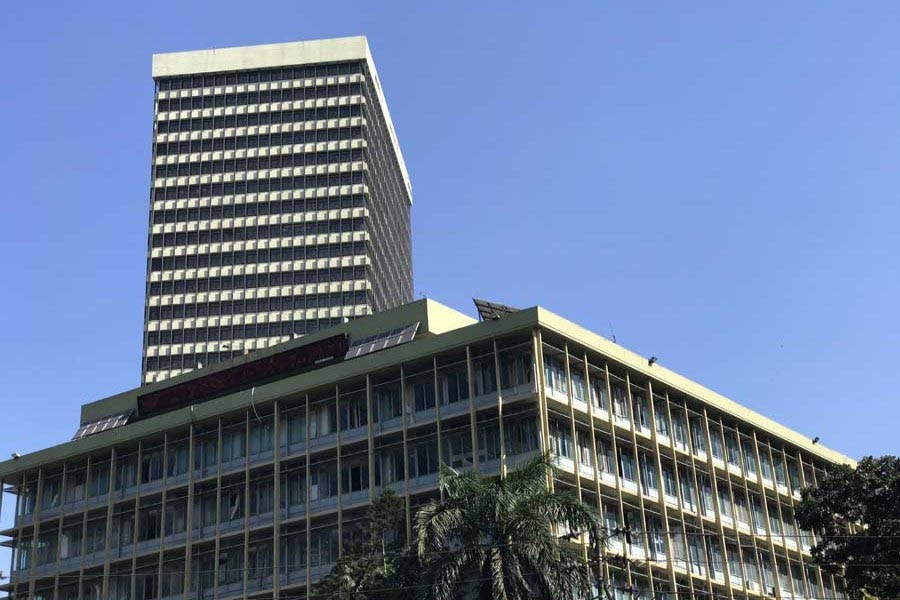
Published :
Updated :

Mr. AMA Muhith, former finance minister had made contrasting statements on the merger and acquisition (M&A) of banks in Bangladesh on two successive dates in the month of December 2016.
He seemed very unhappy about the existence of too many banks in the country as he made a broad hint at merging some of them.
While receiving a dividend cheque from the management of the Bangladesh Development Bank Limited (BDBL) on December 21 he said, "The number of banks (scheduled) now is 56---quite big. I have nothing to say about it since it will shrink in natural course. Some will be merged. We need to be ready with merger and bankruptcy laws", Muhith said.
The next day, while inaugurating 10 new branches of the Mercantile Bank via video conference from a city hotel, he found the existence of too many banks not that 'bad' for the sector as banking services 'have expanded dramatically'.
The second statement did indicate that a powerful quarter either within or outside the government was opposed to the idea of M&A in the banking industry. That is why the former finance minister had to retreat from his stance on the issue.
Almost 50 months after those conflicting statements, participants at a discussion, held on last Saturday in Dhaka, alleged that the government was unwilling to go for M&A though the banking industry needed it most.
That the government is unwilling to recognise the growing weaknesses in the banking sector is evident from the addition of five more scheduled banks during the last four years. The number of scheduled banks is now 61.
The banking sector regulator had to issue licences to a number of new banks, reluctantly. The Bangladesh Bank (BB) was fully aware of the fact that the sector is already oversaturated. Yet it had to succumb to some sort of pressure from the outside.
Bangladesh is not very much familiar with the process of M&A. There have been some acquisitions in recent years. Notable among them was the acquisition of Dhaka Tobacco Company, an Akij Group unit, by the Japan Tobacco International at a cost of about $1.5 billion. The Evercare Group, an international healthcare operator, acquired the Apollo Hospital at Bashundhara at a substantial cost.
Two foreign telecom companies---Robi and Airtel-also merged a couple of years back. Unilever, a multinational company, has taken over the local pharmaceutical unit of the GSK, another multinational, recently.
Bexmico Pharmaceuticals, a leading Bangladeshi drug manufacturer, has struck a deal with Sanofi, the French drug company, to take over its Bangladesh operations. This will be the first incident of acquisition of a major foreign operation by a local private company.
But instances of merger between large local firms, including financial entities, have been rare. But in an economy that has been expanding at an impressive rate, there should be more and more incidents of merger and acquisition. The merger is bound to help both strong and weak entities involved if proper ground work is done beforehand.
M&A has not gained ground in Bangladesh primarily because most commercial and industrial entities are family-owned. Such ownership remains a deterrent to merger. Instead of merging with some relatively strong entities, the owning families try to keep their hold on their enterprises, even at a substantial cost.
Coming back to the issue of M&A in the banking industry, one can safely conclude that this time-tested process should start in Bangladesh. Even a superficial review of the state of the banking industry would find quite a few banks that need to be merged with some strong players. However, all will depend on the willingness of the latter. Better-off banks may not be interested to venture into such a merger.
An in-depth and serious probe into the financial health of banks might reveal something more serious. The situation might call for drastic actions to streamline the state of affairs in the sector.
Undeniably, internal governance, loan administration by individual banks, regulatory control etc., have been weak over the years. This has led to the accumulation of huge non-performing loans. The loan scams and misappropriation of funds are also the products of gross mismanagement in the banking industry.
Of course, there are banks that are being administered well and have a 'manageable' volume of classified loans. But loan scams like Hall-Mark or diversion of funds by a man like PK Halder is enough to destroy all the good works done in the banking industry over the years.
Unfortunately, a section of sponsor-owners---the government is also an owner--- of banks do not have a clean image. Some of their activities do not go well with the sector that plays a very important role in the economy. They, at times, tend to promote their narrow interest, not the interest of banks and depositors---banks' lifeline.
It is high time the central bank made a serious review of the financial health of banks. On the basis of its findings, it should encourage the 'problem' banks to opt for merger. The government on its part should enact a separate law facilitating unhindered and smooth M&A.


 For all latest news, follow The Financial Express Google News channel.
For all latest news, follow The Financial Express Google News channel.